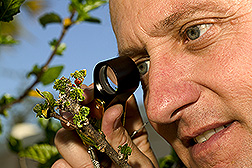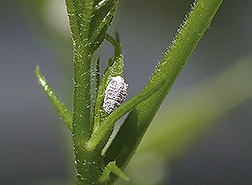This page has been archived and is being provided for reference purposes only. The page is no longer being updated, and therefore, links on the page may be invalid.
|
Read the magazine story to find out more.
|
Predatory Insects May Help Solve Mealybug Problem
By Alfredo FloresApril 14, 2005
Agricultural Research Service (ARS) scientists and cooperators have joined forces to control the pink hibiscus mealybug, which, if unchecked, could cause an estimated $750 million in crop losses annually in the United States.
This invasive pest, Maconellicoccus hirsutus, was first found in Florida several years ago and is spreading within Florida and to other states. As it feeds, the mealybug injects saliva into the plant, causing malformation, stunting and eventual death.
Research leader David Hall and entomologist Stephen Lapointe of the ARS Subtropical Insects Research Unit (SIRU), Fort Pierce, Fla., are leading an effort to find biological methods to stop the pest.
Before the pest came to Florida in 2002, Lapointe, working in St. Croix, U.S. Virgin Islands, discovered that female pink hibiscus mealybugs (PMH) emit a powerful pheromone that attracts males. To recreate this chemical in the laboratory, Lapointe used a hormone analog to eliminate male PHMs from a colony, leaving only females for pheromone analyses.
He also developed a simple diet for feeding the mealybugs, showing that PHM could be reared--for research purposes--on an artificial diet. Due to the expanding infestation of the mealybug, research to develop an optimal artificial diet was recently initiated at the Fort Pierce laboratory.
In addition to these efforts, the USDA's Animal and Plant Health Inspection Service (APHIS) and the Florida Department of Agriculture and Consumer Services responded to the Florida infestation by releasing two effective mealybug parasites, Anagyrus kamali and Gyranusoidea indica, along with a predatory ladybug, Cryptolaemus montrouzieri. These releases have resulted in a reduction of more than 98 percent in PHM population density in some locations.
Lapointe's new artificial PHM diet will enable the production of larger numbers of healthy mealybugs to rear wasps and ladybugs needed for successful PHM-control programs.
Read more about the research in the April issue of Agricultural Research magazine.
ARS is the U.S. Department of Agriculture's chief scientific research agency.


